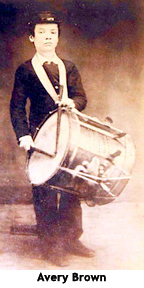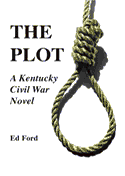|
It took three attempts, but finally he
became the youngest enlisted soldier
Here’s a great trivia question:
Who was the youngest enlisted soldier in the Civil War?
The answer: Eight-year-old Avery Brown, drummer boy for Company C, 31st Ohio Volunteer Infantry.
 On April 15, 1861, three days after the bombardment of Fort Sumter, an urgent call was made for Union volunteers. Samuel Mott responded in August with a group of men from Delphos, Ohio. They were prepared to enlist, but only if one provision was met. On April 15, 1861, three days after the bombardment of Fort Sumter, an urgent call was made for Union volunteers. Samuel Mott responded in August with a group of men from Delphos, Ohio. They were prepared to enlist, but only if one provision was met.
“I have come here with 101 men,” Mott said, “who are ready to enlist on one condition – that our drummer-boy be mustered in with us and permitted to go to the front. Otherwise we disband right here and return home.”
The Army needed men. So, reluctantly, permission was granted. And, Avery Brown – a 4-foot-6, blue eyed, red-haired fatherless boy – became a Union soldier. He had tried to enlist twice previously, but had been denied until his friend – now Capt. Mott – made his ultimatum.
Brown’s unit was assimilated into the 118th Ohio Volunteer Infantry and Avery served with the Delphos contingent on the front lines for 18 months during some of the bloodiest battles the 118th fought, until illness forced him to take a disability discharge in 1863. By the time of his discharge, he had suffered from mumps, measles and rheumatism, the latter making it necessary for him to quit the Army. Stoic in the face of so much human suffering, the young boy had tears in his eyes as he left his company for the last time. In June and July of 1865, the majority of the unit’s survivors were mustered out. Of the 1,000 men enlisted in the 188th Regiment, only 400 returned home.
Avery was presented with a captured Confederate drum at Burton’s Station, Va., an instrument he carried throughout his enlistment. It earned him the title of “Drummer Boy of Cumberland.”
After his discharge, Brown lived in Delphos for three years. In 1866, he moved to Elkhart, Ind., where he worked as a stonecutter and musician. During the next 25 years, Avery organized bands throughout Indiana, Michigan and Ohio, becoming one of the Hoosier state’s best-known solo cornetists. He became close friends with Charles Gerard Conn, who owned the Elkhart-based Conn Musical Instrument Company and became a member of Conn’s Veteran Light Artillery, the only all-veteran company of its kind to be formed following the war. Due to his friendship with Conn, Avery was in a unique position to test every new Conn cornet model as it came out of the factory. In recognition of Avery Brown’s service to his country, and as a tribute to their friendship, Conn presented Avery with a special gold-plated engraved cornet, which became Avery’s most cherished possession.
Avery and his wife, Cynthia, left Elkhart during the 1890s to move to Texas, Wisconsin, and then Michigan, but they returned to Elkhart a few years later, where he lived the remainder of his years.
The youngest Civil War veteran died at his Elkhart home on Nov. 2, 1904 and is buried in Elkhart’s Grace Lawn Cemetery. The captured Confederate drum he played is on display at the Elkhart County Historical Museum in Bristol, Ind., along with his discharge papers and a tintype photograph of the young “Drummer Boy Of Cumberland.”
|














 On April 15, 1861, three days after the bombardment of Fort Sumter, an urgent call was made for Union volunteers. Samuel Mott responded in August with a group of men from Delphos, Ohio. They were prepared to enlist, but only if one provision was met.
On April 15, 1861, three days after the bombardment of Fort Sumter, an urgent call was made for Union volunteers. Samuel Mott responded in August with a group of men from Delphos, Ohio. They were prepared to enlist, but only if one provision was met.